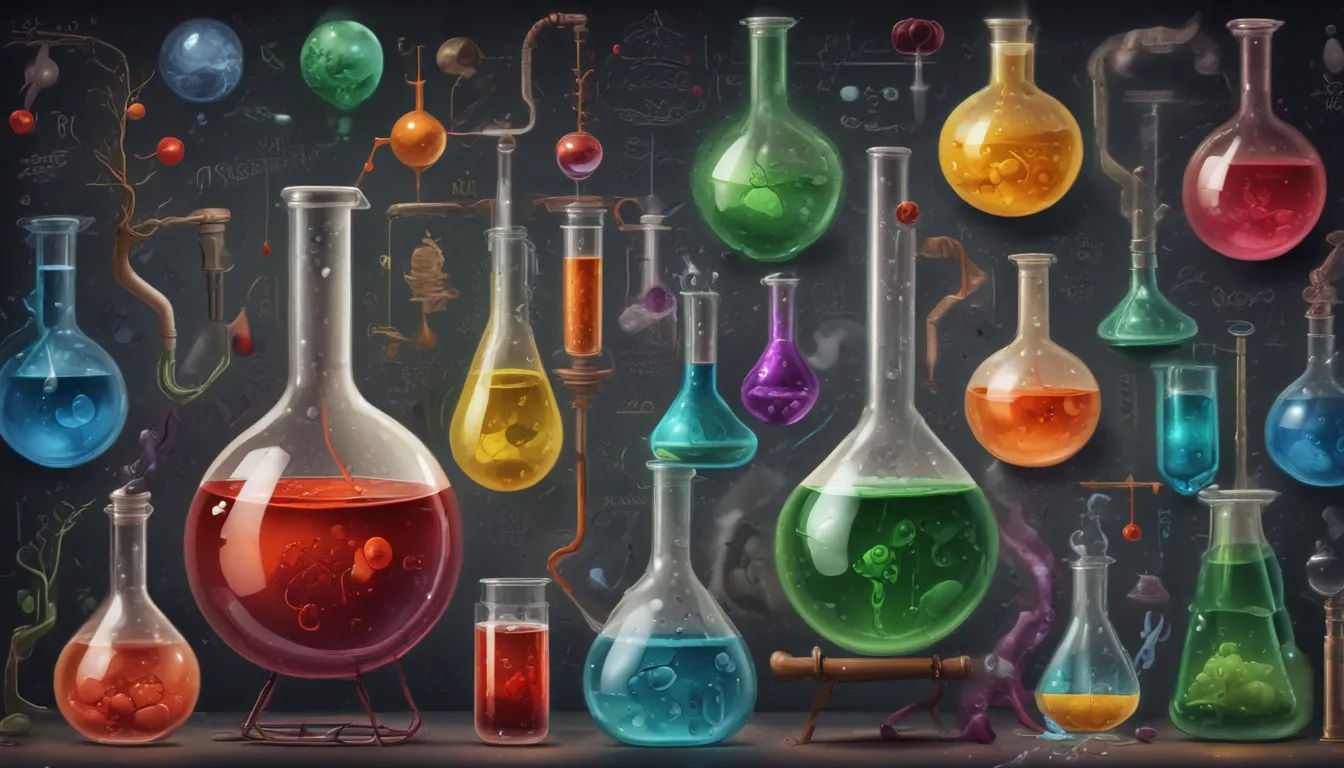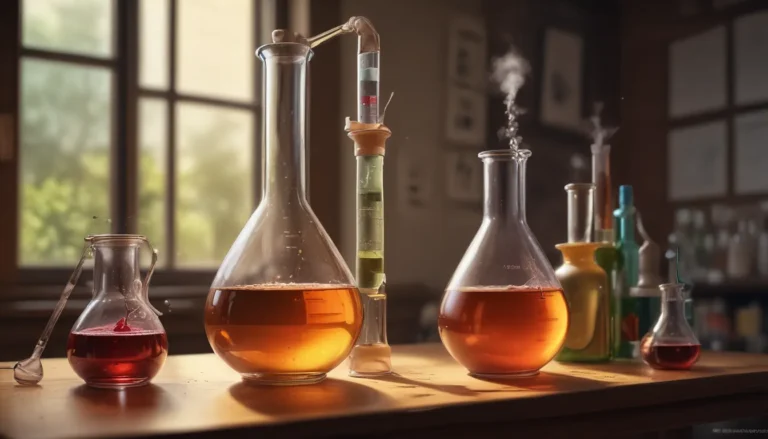A Note About Images: The images used in our articles are for illustration purposes only and may not exactly match the content. They are meant to engage readers, but the text should be relied upon for accurate information.
Chemistry, the study of the composition, properties, and transformations of matter, is a captivating subject that underpins numerous scientific and technological advancements. From the basic building blocks of the universe to intricate chemical reactions, the world of chemistry is filled with awe-inspiring facts that showcase the wonders of the chemical world. Whether you’re a chemistry enthusiast or someone curious about the fascinating realm of chemicals, prepare to be amazed as we delve into 15 astounding facts about chemical substances and reactions.
Unveiling the Mysteries of Chemistry
Chemistry is all around us, shaping the world we live in, from the water we drink to the air we breathe. It acts as a secret code that helps scientists understand and improve our environment. At the heart of chemistry lies the Periodic Table, a map that guides scientists in discovering new elements and understanding the behaviors of different chemicals. It’s a treasure hunt for the fundamental building blocks of everything around us!
The Periodic Table: A Treasure Trove of Information
The Periodic Table is a systematic arrangement of chemical elements that provides crucial information about their atomic structure, properties, and relationships. Acting as a guiding light for scientists and students, it serves as a roadmap for navigating the vast expanse of the chemical world, facilitating the understanding of elements and their interactions.
Deciphering the Essence of Chemical Reactions
Chemical reactions are the fundamental processes that drive the world around us, shaping various industries and impacting our daily lives. From fuel combustion to the synthesis of medicines, these reactions play a pivotal role in transforming matter and energy, showcasing the power and versatility of chemistry in action.
Unraveling the Magic of Chemical Bonding
Chemical bonding is the force that holds atoms together in compounds, dictating their properties such as strength, stability, and reactivity. The type of bonding determines how atoms interact with each other, ultimately shaping the characteristics of the resulting compound and influencing its behavior in chemical reactions.
The Enigmatic Nature of Water
Water, a simple compound composed of two hydrogen atoms and one oxygen atom (H2O), exhibits exceptional properties that are crucial for life on Earth. Known for its high surface tension, boiling point, and heat capacity, water plays a fundamental role in various biological and environmental processes, highlighting the unique characteristics of this essential chemical.
Journey to the World of Atoms
Atoms, the smallest units of chemical elements, retain the properties of their respective elements. Consisting of a nucleus made up of protons and neutrons surrounded by electrons in energy shells, atoms are the building blocks of matter, contributing to the diversity and complexity of the chemical world.
Embracing the Language of Chemistry: Chemical Equations
Chemical equations serve as symbolic representations of chemical reactions, offering a concise way to describe the starting materials (reactants) and products involved. By showcasing the stoichiometry and energy changes associated with reactions, chemical equations provide a comprehensive and structured language for understanding complex chemical processes.
Acids and Bases: A Dance of Opposites
Acids and bases are two distinct types of chemical compounds with contrasting properties. Acids release hydrogen ions (H+) in solution, while bases accept them, leading to a range of chemical interactions with significant implications for pH balance and various chemical processes. Their dynamic interplay shapes the world of chemistry and influences many natural and synthetic reactions.
Carbon: The Pillar of Life
Carbon, a versatile chemical element, serves as the foundation of organic chemistry and is present in all living organisms. Essential for life, carbon forms the backbone of a myriad of compounds vital for biological processes, including carbohydrates, proteins, and nucleic acids, showcasing the central role of carbon in sustaining life on Earth.
The Ever-Expanding Universe of the Periodic Table
The Periodic Table continues to evolve as new elements are discovered or synthesized in laboratories. Recent additions such as Nihonium, Moscovium, and Oganesson have expanded our understanding of chemical elements, enriching the tapestry of the chemical world with novel discoveries and insights into the building blocks of matter.
Harnessing the Power of Chemical Energy
Chemical energy, stored in the bonds of molecules, plays a pivotal role in various applications, from fueling vehicles and power plants to sustaining life processes. The release of chemical energy during reactions drives numerous processes, highlighting its significance as a vital energy source that powers our world and fuels innovation across multiple industries.
Unveiling Secrets through Chemical Analysis
Chemical analysis, a branch of analytical chemistry, involves identifying and quantifying the composition of substances, offering insights into hidden truths and enabling scientists to solve mysteries, ensure product quality, and maintain safety standards. Through precise analytical techniques, chemical analysis unveils the intricate composition of substances, paving the way for advancements in diverse fields.
Bridging Science and Industry: The Essence of Chemical Engineering
Chemical engineering blends principles of chemistry, physics, and engineering to develop processes and materials on an industrial scale. With applications in sectors such as pharmaceuticals, energy, and food production, chemical engineering plays a crucial role in driving innovation, optimizing processes, and bridging the gap between scientific discovery and industrial application.
The Marvelous World of Polymers
Polymers, large molecules composed of repeating subunits called monomers, have revolutionized various industries with their diverse applications. From plastics and fibers to adhesives and biomedical materials, polymers showcase the versatility and adaptability of chemical compounds, contributing to advancements in technology, medicine, and materials science.
Embracing Sustainability: The Promise of Chemical Recycling
Chemical recycling offers a sustainable solution to reduce waste and promote a circular economy by breaking down used plastics and other materials into their constituent molecules for reprocessing and reuse. By harnessing the potential of chemical recycling, we can minimize environmental impact, conserve resources, and address the challenges of waste management in a responsible and eco-friendly manner.
Upholding Safety and Responsibility in Chemical Handling
Ensuring chemical safety and following proper handling protocols are essential to minimize risks in laboratories, factories, and other work environments. By adhering to safety measures, using protective gear, and understanding the hazards associated with chemicals, individuals can safeguard themselves and the environment from potential accidents and harmful exposures.
In conclusion, the astonishing facts about chemicals showcase the pivotal role of chemistry in shaping our world and driving progress in various fields. From the fundamental principles of matter to the intricate processes of chemical reactions, chemistry remains a cornerstone of scientific discovery and technological innovation. By appreciating the wonders of chemistry and embracing its transformative power responsibly, we can continue to unlock new possibilities, improve quality of life, and leave a lasting impact on society.
FAQs: Exploring Common Questions About Chemicals
-
What are chemicals?
Chemicals are substances with distinct molecular compositions that can undergo chemical reactions. They can be found naturally or produced synthetically in various forms, including solids, liquids, and gases. -
How are chemicals used in everyday life?
Chemicals have diverse applications in our daily lives, including household cleaning products, personal care items like cosmetics and soaps, food additives, textiles, electronics, and more. -
Are all chemicals harmful?
Not all chemicals are harmful; their impact depends on factors such as composition, concentration, and exposure. While some chemicals are essential for life, others can be harmful if used improperly or in excessive amounts. -
How do chemicals contribute to medical advancements?
Chemicals play a critical role in the development of medications and medical treatments, aiding in drug synthesis, diagnostic tests, and medical imaging technologies. Chemical research drives innovation in healthcare, leading to new therapies and improved patient outcomes. -
What safety precautions should be taken when dealing with chemicals?
When working with chemicals, it is crucial to adhere to proper safety protocols, including wearing personal protective equipment, working in well-ventilated areas, and understanding the hazards associated with each chemical. Proper storage, handling, and disposal of chemicals are essential to prevent accidents and protect human health and the environment.
The marvels of chemistry continue to inspire and captivate, offering endless opportunities for exploration and discovery. By unraveling the secrets of chemical substances and reactions, we gain a deeper understanding of the world around us and the transformative power of chemistry in shaping our lives. Embrace the wonders of chemistry, and embark on a journey of scientific inquiry and innovation that will expand your horizons, ignite your curiosity, and deepen your appreciation for the incredible world of chemicals.






